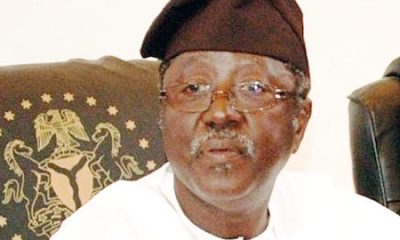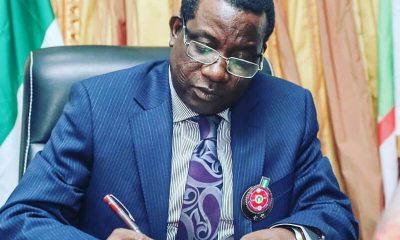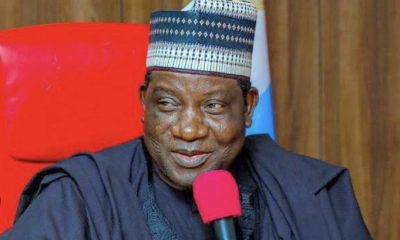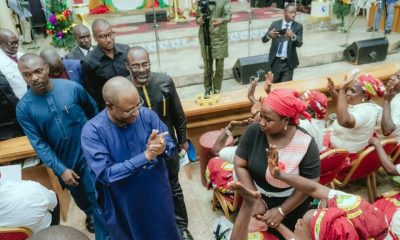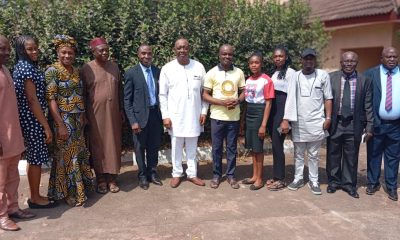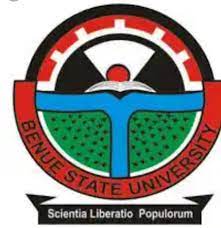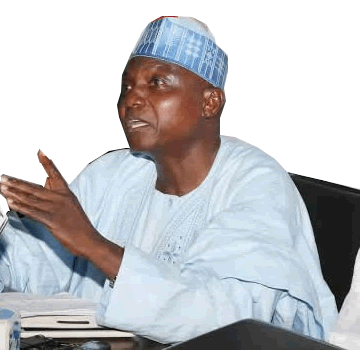FEATURES
Lalong: Redefining Governance Through Patriotism, Governance, Vision and Peace at 59
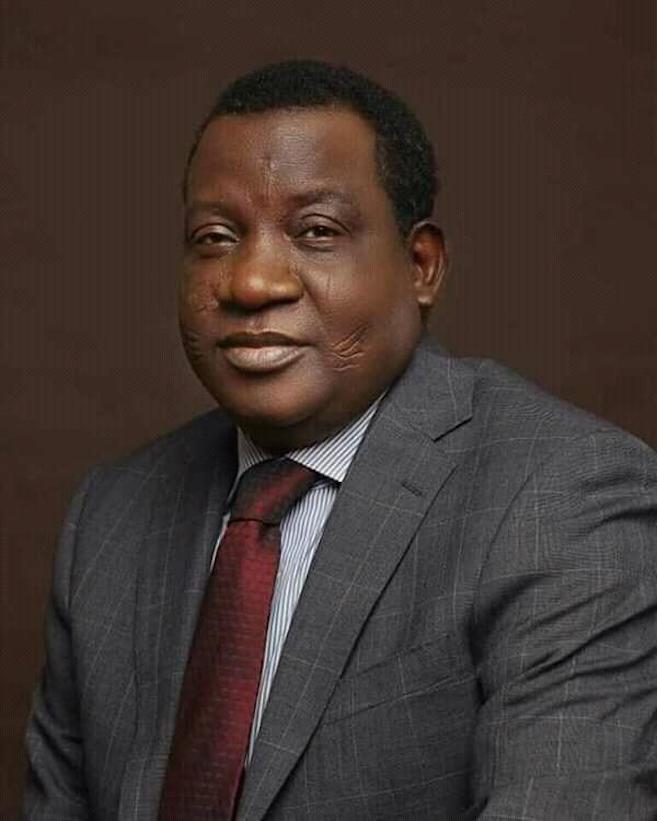
By Makut Simon Macham
The story behind the political journey of Rt. Hon. Simon Bako Lalong, Executive Governor of Plateau State and Chairman, Northern States Governors Forum cannot be fully comprehended without looking closely at his upbringing and early childhood which is a story of grass-to-grace fashioned in resilience, hardwork, humility, trustworthiness, team-spirit and forgiveness.
Those who know him from the glitter of the offices he has held including the current one as Governor may think of him as someone who has always been privileged or raised with a silver spoon.
For others who have known him in the last 59 years, Simon Bako Lalong is a product of God’s grace and the determination of a man to use his gifts and talents to overcome all limitations around him.Lalong has spoken severally of being raised in the then rural village of N’yak also known as Ajikamai in Shendam Local Government to poor parents who had little to offer him and his siblings for a bright future.
To make matters worse, losing his father early in life meant that the burden of leadership fell on him prematurely being the first born. Nevertheless, he took up the challenge and submitted himself to God and the discipline of his Uncle and benefactors who took him to Shendam where he continued his education and gradually blossomed amidst difficulties.
Through God’s help, he successfully passed through all levels of education to acquire a Law Degree from the prestigious Ahmadu Bello University Zaria before being called to the Nigerian Bar in 1991. This opened the doors of glory to him.
It is also important to point out the impact of education and the Church in the life of Simon Bako Lalong who tells everyone that the secret of his success and outlook in life is rooted in the Catholic Doctrines inculcated in him very early in life which have shaped his mind about people and service.
Many testify to his easy going nature and capacity for love, forgiveness, honesty, compassion, self-control, humility among others which are enumerated in the Holy Bible as the Fruit of the Spirit (Galatians 5:22).
This foundational attributes boosted by experience and exposures have continued to define him since he joined politics. Before seeking political office, Simon Bako Lalong demonstrated his passion for service through many youth, cultural and professional bodies.
These include Assistant Secretary, Nigeria Bar Association, Plateau State Chapter; National President of Goemai Youth Movement; Youth Activist and one of the leaders within the Plateau Youth Council many years ago. These responsibilities espoused his competence and thus made it easy for the people to trust him with leadership when in 1999, he contested and won election into the Plateau State House of Assembly to represent Shendam Constituency.
Within one year in the House, having served as Chairman, House Committee on Judiciary; Member, House Committee on Local Government & Chieftaincy Affairs, Public Accounts/Petition and Agriculture, he emerged Speaker and successfully served for 7 years – the longest so far in the political history of the State.
Although his tenure as Speaker was not without challenges, Lalong displayed the earlier enumerated attributes of resilience, truth and justice when he held on strong in the face of political tyranny and Federal Might that saw him being illegally removed and his seat declared vacant.
Because he stood on truth and justice, his Recall from the House of Assembly failed woefully while his purported impeachment was upturned by the courts later. In the face of these challenges, his tenure as Speaker is praised for passing the Laws establishing Plateau State University, Bokkos (an institution he brought back to life after it was shut down by the Jang administration); College of Agriculture Garkawa; College of Arts, Science and Remedial Studies, Kurgwi; Bills on Creation of additional/new Chiefdoms, Districts and State Electoral Wards, as well as Bill on establishment of structures in Local Government Councils.
As Speaker, he endeared himself to fellow Speakers across the 36 states in Nigeria and was elected twice as Chairman, Nigerian Conference of Speakers from 2001-2002. Today, he is the National Chairman, Conference of Former Speakers of State Houses of Assembly (COFSSHA).
Despite his travails and suffering as Speaker for refusing to carry out an illegal impeachment of the then Governor of Plateau State Chief Joshua Chibi Dariye, Governor Lalong maintained absolute calm and embraced his ordeal with equanimity, leaving vengeance to God rather than attempting to take his pound of flesh even when he eventually emerged Governor in 2015. Putting his foundational attributes of love, forgiveness, honesty, compassion, self-control, and humility to work, he faced Governance head-long rather than dissipating energy fighting perceived enemies.
Little wonder, from 2015 when he took over the as Governor of Plateau State, Lalong changed the trajectory of Governance by removing personal sentiments from public service.
He decided to end the culture of personalizing public projects and abandoning people’s resources because of personal ego or political differences. Despite taking over from a Government of a different political party, he vowed to complete all viable and useful projects that have direct impact on the people.
This he has done with tremendous success with the completion of projects not only abandoned by former Governor Jonah Jang, but some dating as far back as the Government of Chief S.D. Lar.
Today, the Mararaban Jama’a – Secretariat Junction road abandoned at about 30 percent with less than one lane done, is fully completed and in use as one of the major dual carriage gateways to the State.
The Secretariat Junction Flyover Bridge also inherited was equally completed and has been in use to the delight of motorists and citizens. Similarly, the Riyom General Hospital and Trauma Centre is completed and in use while the General Hospitals in Kwall, Kanke LGA and Mabudi, Langtang South LGA are also completed and will soon be put to use. The list goes on and on.
Having spent most part of his first tenure completing these inherited and abandoned projects, Governor Lalong continued the implementation of Rescue Mission anchored on Peace, Security and Good Governance; Infrastructural Development; and Sustainable Economic Rebirth.
Many road projects within the Jos and Bukuru metropolis have been carried out with most of them rehabilitated, reconstructed or newly constructed. The metropolis is also electrified with solar street lights stretching close to 100 kilometres which have enhanced security, aesthetics and night life in the metropolis.
The Plateau Judiciary is about taking possession of a brand new High Court Complex touted to the best in the country.
His sense of Justice, equity and fairness has pushed him to democratize infrastructural development by distributing projects across the 17 Local Government areas and always thinking of the grassroots.
He has thus ensured that all Local Governments have water, road and other projects including the Lalong Legacy Projects which constitute of world standard Schools and Hospitals.
These legacy projects when completed will redefine the face of education and health in Plateau State and ensure that the Legacy of the Rescue Administration lives on for many years to come. But for the legal impediments arising from the dispute between the Government and the former contractor, the Legacy Projects would have been commissioned already. However, the obstacle has already been crossed and the projects will be completed shortly.
Gradually, Governor Lalong is steadily but quietly fulfilling his campaign promises with the introduction of new projects which have dealt a huge blow to his critics who despite enjoying the many inherited and abandoned projects which he completed and others he initiated, prefer to wallow in self-deceit and political numbness just to discredit him.
Early this year, he invited Former Head of State Gen. Yakubu Gowon to flag-off the construction of the British-American Flyover and Dualisation to Lamingo Roundabout.
The quality and rapid progress of the work has been impressive and a tale of excitement among citizens. As for the famous Jos Main Market which was burnt down many years ago, the Governor’s determination to find funding has finally paid off with one of Nigeria’s financial Institution, Jaiz Bank agreeing to fund the project on a PPP arrangement. This project which will soon kick start promises to be on of Governor Lalong’s parting gift for the good people of Plateau State.
Without doubt, an area where Governor Lalong’s best has earned him accolades home and abroad is the area of peace and security which remains closest to his heart. His achievements in this area make him second to none in Nigeria as he has virtually erased the recent previous perception of Plateau as a crises-ridden State and a no-go-area.
By establishing the Plateau Peace Building Agency and the Inter-Religious Council, Governor Lalong has diffused the ethno-religious sentiments that were hitherto used as trigger for strife and violence.
Little wonder, the State has not experienced ethno-religious crises in a long time except for criminal attacks on innocent citizens by terrorists who have tried unsuccessfully to use religion and generate the bias to instigate the peace loving people to carry arms against one another.
This has led to the isolation of these criminals who strike on innocent citizens in the dark of the night killing, maiming, and destroying houses and properties such as in Bassa, Riyom and of recent Kanam, and Wase among others.
Yet, the Governor has remained resolute in strengthening the Operation Rainbow and supporting other security agencies such as the Police, Operation Safe Haven, DSS, Civil Defence and others in facing the criminals headlong. Last year alone, He purchased and distributed 50 patrol cars and 200 security motorcycles to security agencies.
In addition, he has introduced Community Policing in conjunction with Vigilante and Neighbourhood Watch Groups and Traditional Institutions that provide intelligence to security agencies. Many were therefore not surprised when after many years, Local Government Elections were conducted in the 17 Local Government Areas of the State in September 2021 without any problems. In the past, attempts to conduct such elections in places such as Jos North became a trigger for violence and bloodshed.
The increased security and safety in Plateau State have resulted in the inflow of more investments into the State by new businessmen and those who had left the State reluctantly during the dark days.
Today, the city is always full with people and hotels are almost always sold out. Government, Private Sector, Professional Bodies and Non-Governmental Agencies are falling over one another to host major national and international conferences and AGMs in Jos.
They find it very convenient as the Lalong Government successfully brought in Max Air to operate a flight to and from Abuja, the nation’s capital. The flight has been so successful that within a short time, the flights are almost always fully booked making it necessary for the airline to increase frequencies to almost daily. On the whole, the economy of the State has picked up and citizens are experiencing more prosperity through the establishment of SMEs.
Thanks to the creation of an enabling business environment, citizens and corporate organisations are more willing to pay their taxes while the Plateau State Inland Revenue Service has been restructured and with the help of a reputable tax firm now generates more money than before.
This has given the Government an opportunity to not only continue its regular payment of salaries and pensions, but also carry out other obligations to contractors and other partners. Indeed, the Lalong Rescue Administration has demonstrated fidelity and prudence in utilization of public resources through the establishment of Efficiency Unit (EU), Liquidity Management Committee (LMC), Due Process Office, Project Monitoring and Result Delivery Office (PMRDO), implementation of the State Fiscal, Transparency Accountability and Sustainability Program (SFTAS) as well as being a member of the Open Government Partnership (OGP). Little wonder, the records of financial and fiscal discipline won Plateau State the Transparency and Accountability in Extractives at the 2020 OGP Local Innovation Awards held in Seoul, South Korea (1st in Africa). This is after it had won the Award as the second least Corrupt State in Nigeria by the National Bureau for Statistics (NBS).
Turning 59 years weeks before his 7th year in office, Governor Simon Bako Lalong shows his credentials as a man whose rise to public office is certainly not for self-aggrandizement, vain glorification and lucre, but for service that is stewed in humility, fairness, justice and love for the less privileged who like him, depend on God for upliftment and a better life.
He remains a darling of Civil Servants who call him “Governor Alert” after seven years of consistent payment of their wages as and when due – a clear departure of what they experienced before his coming into office.
His democratic credentials and leadership position on the National Stage continue to blossom as he walks the talk when it comes to the rule of law and encouraging the growth of democracy.
He remains the first Governor in Nigeria to implement full Autonomy for the Legislature and Judiciary as well as Local Governments. This is in addition to his leadership of the Northern Governors Forum and huge sacrifices for the building of the ruling All Progressives Congress (APC). With this background, it becomes more convincing that Simon Bako Lalong has a destiny with fate in the coming years particularly after the 2023 elections when his tenure ends as Governor of Plateau State.
Already, groups are mounting uncommon pressure on him to go higher in the service of the nation with the Plateau Legacy Group purchasing the form for him to run for the Plateau South Senatorial District Seat.
As the Chairman of the group and Member representing Pankshin, Kanke, Kanam Federal Constituency, Rt. Hon. Yusuf Gagdi succinctly puts it, “leaders like you should not do what they have done to Plateau people and retire home. You have done so much for Plateau State and Nigeria at large and that is why we have put our heads together to take the decision to buy the form for you to contest. You have so much to offer”.
On this special occasion of his 59th birthday, the prayer is for God to give Governor Simon Bako Lalong good health, more wisdom and courage to continuously operate in the will of God and stay true to the early teachings and training he got from the Bible which have taken him thus far.
Happy birthday, Your Excellency!
Makut Simon Macham, Ph.D., Director of Press and Public Affairs to the Governor of Plateau State writes from Jos.
FEATURES
The GMO Debate in Nigeria: Concerns over Safety, Regulations

A nationwide rally against Genetically Modified Organisms (GMOs) in Nigeria has brought to the fore the concerns of experts over the potential health and environmental risks associated with the introduction of the organisms into the country’s food system.
The rally, led by the Health of Mother Earth Foundation (HOMEF) in collaboration with the GMO-Free Nigeria Alliance and civil society organisations took place on December 13 in major cities across the country.
According to the conveners of the rally, the outing is aimed to raise awareness about the dangers of GMOs and to pressure the government to reconsider its decision to approve genetically modified foods in the country.
The World Health Organisation (WHO) describes GMOs as organisms whose genetic material has been altered using genetic engineering techniques.
The alteration, according to the international health agency, involves the use of biotechnology to introduce genes from one species into the DNA of another species, creating a new organism with desired traits.
Therefore, genetically modified foods are foods that have been altered using genetic engineering techniques.
At the heart of the controversy is the claim by proponents of GMOs that they can help address food insecurity in Nigeria.
They assert that crops can be engineered to be more resistant to pests and diseases, reducing losses and increasing yields.
One of the proponents of GMOs is Kabiru Ibrahim, the National President of the All Farmers Association of Nigeria.
Therefore, the advantage is that it would even take farmers out of poverty.
“Any country in the world that you see has food security, as a matter of fact, they also do GMO. Nigeria will attain food security if it embraces GM crops.
“The way out of poverty and to get into food security for Nigeria is through GM crops.
“This is why Brazil is now a developed country. Most of what comes out of Brazil, in terms of corn, beans, and all that, are all GM’’, Ibrahim said.
However, Dr Nnimmo Bassey, Executive Director of HOMEF, argues that Nigeria does not need GMOs to address food insecurity.
The design of the GM crops, he maintains, does not support local economic growth but promotes dependency on corporate seed supply.
Bassey cites the example of the National Cotton Association of Nigeria (NACOTAN), which reported no significant increase in yields after introducing GM cotton seeds four years ago.
Instead, he says, the yield per hectare remained the same, and farmers noted that no other plant could germinate on the farmlands where the GM seeds were planted, even after four years.
This, Bassey argues, confirms concerns about loss of biodiversity and soil degradation due to the release of genetic material into the soil.
On his part, Ifeanyi Nwankwere, National Co-coordinator of the GMO-Free Nigeria Alliance, says “GMOs approved in Nigeria are not currently being labelled.
“The country’s socio-economic context does not allow for effective labelling, considering how food is sold in cups and basins in open market where majority of the people shop from,” he said.
Nwankwere said the biosafety regulatory system in Nigeria was not designed to ensure safety with regard to GMOs.
For instance, he alleged, the National Biosafety Management Agency (NBMA) Act had fundamental flaws, including the lack of provision on the precautionary principle, inadequate provision on public participation in decision making and others.
Similarly, Mariann Bassey-Orovwuje, Deputy Director at Environmental Rights Action, cautions that several other countries, including Russia, Mexico, Uganda, and up to 23 more, have placed bans on GMOs, citing the recent ban of GMO corn in Mexico.
“The courts highlighted the threats of the GMO variety to the country’s rich diversity of corn, stating that the genetically engineered corn posed the risk of imminent harm to the environment,” she said.
Experts also argue that the introduction of GMOs in Nigeria poses serious health risks.
According to a recent report by an Iranian researcher, GMO soybean caused significant damage to internal organs such as the liver and kidney in rats.
More so, as noted Joyce by Brown, Director of Programmes at HOMEF, there is no evidence that the National Biosafety Management Agency (NBMA) has conducted medium or long-term feeding tests to ascertain the safety of GMOs approved for use in Nigeria.
She bemoaned the presence of more than 50 imported packaged food products, containing GM ingredients in Nigeria.
These products, according to her, are abundant in market shelves across the country in different brands including cereals, vegetable oils, spices, ice-creams, and cake mixes amongst others
In Benin, where Agho Omobude, Coordinator of the Edo Civil Society Organisations (EDOCSO) led others on a march to Edo House of Assembly, state office of the Federal Ministry of Agriculture and Food Security and the Government House.
At those placed petitions were submitted, particularly in respect of the recent approval of 14 genetically modified foods in the country.
Omobude advocated legislations that would outlaw the sale of genetically modified foods in the state aa well as the country. He raises concerns over some super markets in the state which are reportedly selling the products without providing the customers with information about them.
All in all, the campaign against GMOs in Nigeria is not just about health and environmental risks; it is also about the economic implications of introducing GMOs into the country’s food system.
As argued by Bassey, the promotion of GMOs is driven by the interests of multinational corporations, which are more concerned with profits than with the welfare of Nigerians.
The demands of the campaign are clear, a ban on GMOs, including products brought in for food and food processing, as well as packaged processed foods.
The coalition also demands the nullification of all permits granted for GMOs, as they are not backed by adequate and certified risk assessments.
Furthermore, the experts call for an investment in agroecology, which ensures food security and food sovereignty while strengthening the Nigerian economy.
Inarguably, the foundation of a nation’s sovereignty lies in its ability to produce and control its own food. Without this, sovereignty is merely a theoretical concept.
Anti-GMOs insist that its introduction into the country’s food system poses significant risks to human health, the environment, and the economy.
It is imperative that the government takes a cautious approach and considers the concerns of experts and civil society organisations before making any decisions about GMOs. (NANFeatures)
FEATURES
Breaking the Stigma of Male Victims of GBV

For decades, the narrative around Gender-Based Violence (GBV) has been dominated by the plight of women, with men often portrayed as the perpetrators.
However, the story of John Adegoke, a 35-year-old father of two, tells a different side of this issue.
On one fateful night, Adegoke’s wife became enraged, and the situation regrettably turned violent, leaving him with a broken arm and a shattered sense of self-worth.
“I felt so ashamed and embarrassed.
I didn’t know where to turn or who to talk to. I felt like I was all alone,” he recalls.Adegoke is not the only man with such an experience.
Similarly, Michael Osunbor, a 28-year-old entrepreneur, found himself a victim of abuse.
Osunbor’s partner was emotionally and verbally abusive, constantly belittling him, calling him names, and threatening to leave.
“I felt like I was walking on eggshells around her. I never knew what would trigger her anger. I felt like I was losing myself in the relationship,” Osunbor recounts.
Both Adegoke’s and Osunbor’s stories are not isolated incidents.
In fact, according to the World Health Organisation (WHO), one in six men will experience some form of GBV in their lifetime.
Furthermore, a study by the National Demographic and Health Survey (NDHS) in Nigeria revealed that 16 per cent of men reported experiencing physical violence, while 12 per cent reported emotional violence.
In spite these alarming statistics, male victims of GBV often face significant barriers when seeking help.
Societal norms surrounding masculinity make it difficult for men to admit they are victims.
Consequently, many feel ashamed or embarrassed and may fear being perceived as weak.
Mr Sulaiman Abaya, a renowned legal practitioner, says that men also suffer domestic violence, which can take psychological, economic, or physical forms.
However, he laments the lack of recognition and support for male victims of GBV.
“Even international conventions, protocols, and charters, which are domesticated locally, focus primarily on women as victims, with little emphasis on men. This is the root of the skewed narrative,” Abaya observes.
He further explains that men are socialised to appear strong and stoic, which often discourages them from seeking help.
This stigma, in turn, leads to a lack of support services tailored to male victims.
The consequences of this silence, according to human rights advocates, can be devastating.
Male victims of GBV are more likely to suffer mental health challenges such as depression and anxiety.
Moreover, they may turn to risky behaviours, such as substance abuse, as a coping mechanism.
Dr Rosemary Smith, a human rights activist, expresses these sentiments.
She notes that societal perceptions of masculinity often force male victims to suffer in silence.
“Men who experience GBV are often left without access to the support services they need.
“This can have serious consequences for their physical and mental health, and it perpetuates a cycle of violence and silence,” she says.
Smith emphasises the need to break down the stigma surrounding male victims and dismantle stereotypes about GBV.
To achieve this, she calls for inclusive support services that address the unique needs of both men and women.
“We need to create a safe and supportive environment where men feel comfortable coming forward and seeking help.
“This requires a fundamental shift in the way we think about GBV and recognition that men can be victims too,” she explains.
Abaya suggests that collecting data on GBV against men is critical.
In addition, he advocates for robust campaigns to raise awareness and encourage men to report cases of abuse.
“Human rights agencies should begin to recognise men’s rights. There could even be dedicated platforms, such as Facebook pages, for reporting GBV against men.
“Similarly, support systems should be put in place to help male victims,” he recommends.
In addition to providing support, Mr Samuel Chukwu, a Benin-based family adviser and counsellor, underscores the importance of addressing the root causes of GBV.
He highlights the need to challenge societal norms around masculinity and power.
“We need to challenge the societal norms that perpetuate GBV and promote a culture of equality and respect.
“This requires collective efforts from the government, civil society, and individuals,” Chukwu says.
He also identifies counselling, advocacy, and other tailored forms of support as essential measures to address the issue and help victims heal.
Similarly, Mrs Christy Ipinlaye of the Olive Foundation stresses the importance of awareness.
According to her, public campaigns, community outreach, and education are key to breaking the stigma and encouraging men to report cases of abuse.
As the world concludes the 2024 16 Days of Activism Against GBV, it is vital to remember the often-overlooked victims of this societal menace.
By breaking down the stigma and providing tailored support services, society can move closer to a world where everyone lives free from violence and fear. (NANFeatures)
FEATURES
Port Harcourt Refinery: Revival Signals New Era for Nigeria

Years after it went comatose, the Port-Harcourt Refinery rose up from ‘death’, courtesy of the seriousness attached to the all-important plant by its owners, the Nigerian National Petroleum Corporation Ltd. (NNPCL).
Little did stakeholders anticipate such a milestone could be swiftly achieved, boosting Nigeria’s domestic refining capacity.
After years of delays, maintenance challenges and rising dependency on imported refined petroleum products, the inauguration of the plant promises to be a potential shift in the country’s fuel supply dynamics.
While the government and industry stakeholders have lauded the achievement, the re-establishment of the operation did not go without hydra-headed challenges.
The Port-Harcourt refinery comprises two units, with the old facility capacity of 60,000 barrels per day (bpd) and the new plant, 150,000 bpd, both summing up to 210,000 bpd.
The refinery was shut down in March 2019 for the first phase of repair works after the government secured the services of Italy’s Maire Tecnimont, to handle the review of the facility with the oil major Eni as technical adviser.
In 2021, NNPCL announced the commencement of works at the PHRC after the Federal Executive Council (FEC) approved $1.5 billion for the project.
In December 2023, the government announced the completion of the mechanical and the flare start-off, one of Nigeria’s oldest and most critical facilities, inaugurated to reduce dependency on foreign refineries.
With the capacity to process over 210,000 barrels of crude oil per day, the refinery is expected to significantly boost local production of petroleum products, including petrol, diesel and kerosene.
In a landmark move, NNPC Ltd. officially began production at the facility, signaling a return to active refining operations after years of dormancy and extensive rehabilitation work.
The christening on Nov. 26, was attended by major stakeholders: government officials and industry experts, all of who expressed optimism about the refinery’s potential to enhance domestic fuel supply and job creation.
While the inauguration is a monumental achievement, the journey to full operational capacity has not been without its noticeable hiccups.
Reports indicate that there are still several operational and logistical challenges facing the refinery, including issues with the supply of crude, infrastructure inadequacies and technical glitches.
Also, there are concerns about the refinery’s ability to operate at full capacity consistently, as its systems have suffered from years of underinvestment.
The prolonged downtime and intermittent operations have raised doubts about whether the refinery can contribute meaningfully to meeting Nigeria’s domestic fuel needs without delay.
Though the refinery’s management has acknowledged some of the identified setbacks, yet, it remains committed to resolving the issues in the short-term to avoid further disruptions.
In spite of the challenges, stakeholders within Nigeria’s oil and gas sector including Dr Ayodele Oni, a Partner at Bloomfield Law Practice, notes the reopening is a positive step towards addressing the nation’s fuel supply crisis.
Oni says the Port-Harcourt’s production is expected to significantly reduce the nation’s dependence on imported fuel, which has long been a source of concern due to the foreign exchange burden and the fluctuations in international oil prices.
According to him, for Nigeria’s local refineries, the Port-Harcourt refinery holds the promise of reducing astronomical price of fuel imports, by ultimately saving the country’s billions of dollars annually.
It is also anticipated to create thousands of jobs, both directly and indirectly through the supply chain, from transportation to distribution.
Mr Mike Osatuyi, a former National Operations Controller of the Independent Petroleum marketers Association of Nigeria (lPMAN), says by the inauguration, the refinery is expected to contribute to Nigeria’s energy security by bolstering its refining capacity.
Osatuyi says this shift can pave the way for more refineries to return to full capacity and help Nigeria meet its increasing energy demand.
According to him, the refinery’s operational success could drive the government’s push for improved infrastructure in the downstream oil and gas sector, thereby creating a more self-sufficient and sustainable energy ecosystem.
“Local businesses and citizens stand to benefit from a more stable and reliable supply of fuel, which is crucial for everyday activities and economic growth.
Also, industry observers, according to him, will be quick to predict that an efficient, fully operational Port-Harcourt refinery can lead to reduction in the country’s fuel scarcity which has led to long- queues at filling stations and rising fuel prices.
An energy expert, Mr Salisu Danjuma, explains the corporation’s assignment should not end with the Port Harcourt Refinery alone.
Danjuma notes the corporation has laid out plans to increase its capacity with the completion of the Warri and Kaduna refineries, as well as enhancing the operations of the Port Harcourt plant.
He believes the goal is to make Nigeria a net exporter of refined petroleum products, reducing the country’s dependency on imported fuels while creating a robust energy sector that can support both domestic and international demand.
According to him, while the current phase of the Port Harcourt refinery’s operations is a positive indicator of progress, NNPC Ltd. still faces the task of addressing its operational challenges and ensuring long-term sustainability.
“The government has committed to investing in more capacity expansion and technology upgrades to modernise the country’s refineries.
“The commissioning of the Port Harcourt Refinery is undoubtedly a significant step for Nigeria’s oil and gas sector, with the potential to reduce the country’s fuel import bill and improve domestic fuel supply.
“While the refinery’s operations face some initial setbacks, the initiative is hailed by stakeholders as a critical move toward enhancing the nation’s energy security, boosting economic growth, and creating employment opportunities.
“Moving forward, the full success of the Port Harcourt Refinery will depend on the NNPC Ltd.’s ability to tackle its current operational challenges, ramp up production and create a stable and efficient refining ecosystem.
“If these obstacles are overcome, Nigeria could see a transformative shift in its energy landscape, reducing its reliance on imports and promoting self-sufficiency,” he added.
Reacting, the Nigeria Union of Petroleum and Natural Gas Workers (NUPENG), acknowledged the support of President Bola Tinubu, as well as the collaborative efforts of the NNPCL Board and contractors for the successful hauling of the facility.
Its President, Mr William Akporehe, and General Secretary, Mr Afolabi Olawale, described the commencement of the crude oil processing and the dispatch of petroleum products from the refinery as a landmark achievement that resonates with the aspirations of Nigerian citizens.
The union declared that the achievement demonstrated by NNPCL’s commitment to the country’s sustainable economic growth cannot be over-emphasised.
It commended the Group Managing Director of the corporation, Mele Kyari, for steering PHRC’s rehabilitation to completion, despite numerous challenges.
Nigeria owns four refineries: two in Port Harcourt and one each in Warri and Kaduna; but they have been moribund for years despite the Turn-Around-Maintenance (TAM) efforts.
The moribund state of the local refineries pushed Nigeria to depend solely on the importation of petroleum products for domestic use for several years, constituting a major drain on the nation’s foreign reserves.
For decades, successive administrations moves at reviving the nation’s refineries to reduce dependency on petrol importation failed.
In 2015, former President Muhammadu Buhari pledged to optimise those performing below capacity and boost foreign reserves by halting importation of refined fuel.
In November 2018, that administration scheduled December 2019 as the terminal date for three of the refineries to attain full production capacity to end petroleum importation and later shifted same to 2020.
Though, while the 2020 deadline was not realised, the government had spent N10.23 billion as at June 2020 on three of the refineries which processed zero crude.
By May 2023, the Federal House of Representatives Ad-hoc Committee on the state of refineries in the country made a disclosure that the federal government had spent over N11 trillion on the rehabilitation of the refineries between 2010 to 2023.
Just August 2023, President Bola Tinubu assurance that the PHRC would become functional by December after numerous failed attempts is now a reality.(NAN)



